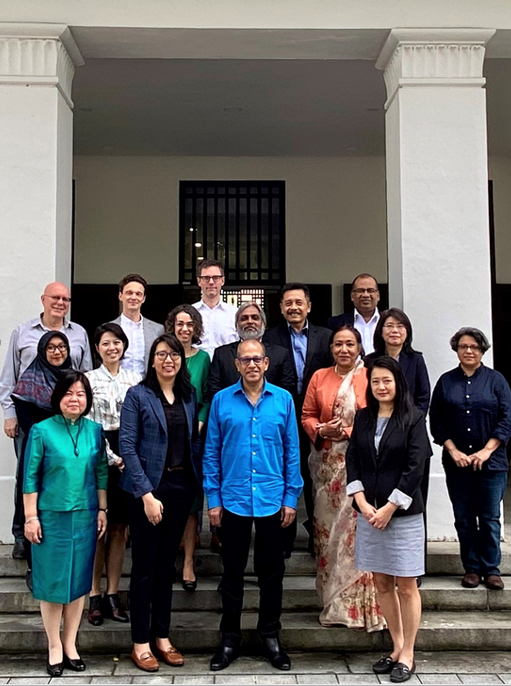TCC at the NUS Law Workshop on
"Judging and Social Cohesion in Asia: Insider's Perspectives"
Upon invitation of the Faculty of Law, National University of Singapore (NUS Law), Justice Horng-Shya HUANG and Research Judge Yi-Yi LEE attended the "Judging and Social Cohesion in Asia: Insider's Perspectives" Workshop on behalf of the Taiwan Constitutional Court (TCC) during February 16 to 17, 2023.


Workshop participants at the Eu Tong Sen Building, NUS Law. Front row (left to right): Justice Horng-Shya Huang (TCC), Assoc. Prof. Dian Shah (NUS Law), Dr. Mario Gomez (NUS Law), Assoc. Prof. Jaclyn Neo (NUS Law). Second Row (left to right): Ms. Ratu Durotun Nafisah (NUS Law), Research Judge Yi-Yi Lee (TCC), Assoc. Prof. Maartje De Visser (SMU Law), Justice Datuk Vazeer Alam Mydin Meera (Court of Appeal, Malaysia), Justice Sapana Pradhan Malla (Supreme Court, Nepal), Prof. Wen-Chen Chang (NTU Law), Prof. Sarbani Sen (JGLS). Third Row (left to right): Prof. Andrew Simester (NUS Law), Prof. Matthew Nelson (SOAS), Former Justice Dr. I Dewa Gede Palguna (Constitutional Court of Indonesia), Justice Yasantha Kodagoda (Supreme Court, Sri Lanka).
The Workshop, held by the Centre for Asian Legal Studies (NUS Law), aimed to explore how "social cohesion" is conceived, operationalized, and regulated through judicial decision-making and reasoning. Participated by judiciaries and academics from various jurisdictions—including Malaysia, India, Indonesia, Taiwan, Pakistan, Afghanistan, Sri Lanka, Nepal, and the UK— the workshop sought to unpack and understand the complexities and strategies of judging in cases involving social cohesion issues.
Justice HUANG delivered a speech during the third workshop panel under the title "The Rule of Law, Fundamental Rights and Social Cohesion in Taiwan—a selection of cases" (co-authored with Research Judge LEE). Her speech recounted how TCC, taking the implication of social cohesion into consideration, navigated itself between competing interests and ideas in its decisions: from that of diverse cultures, different ethnic groups, and polarized political ideologies in Taiwanese Society. Justice HUANG provided an analysis of how TCC conceptualized social cohesion in Judgments 111-Hsien-Pan-4 (Indigenous People Status of Children of Intermarriage between Indigenous and Non-indigenous People Case), 111-Hsien-Pan-17 (Case on the Indigenous Peoples Status for the Siraya People), 112-Hsien-Pan-1 (Case on Gender Equality in the Qualification for Successor of Ancestor Worship Guild), and J.Y. Interpretation No. 791 (Case on the Constitutionality of the Criminalization of Adultery).




The "Judging and Social Cohesion in Asia: Insider's Perspectives" Workshop at NUS Law.
The "Judging and Social Cohesion in Asia: Insider's Perspectives" Workshop at NUS Law.
Justice HUANG concluded her speech by pointing out that “the constitutional court’s task to carry out a stable society whilst safeguarding fundamental rights and the liberal democracy is never straightforward.” She hoped that the experience of TCC may inspire further dialogues between international law practitioners and academics.